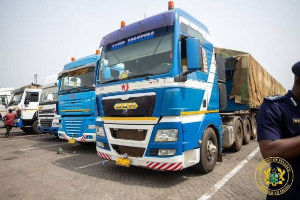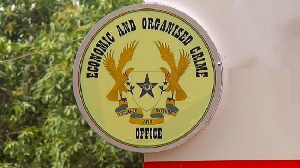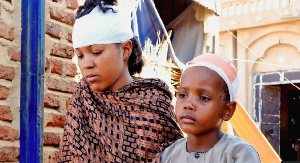Is Ghana becoming a basket case? Certainly not, but to reduce poverty and promote democracy and prosperity, the management of the affairs of state must be more prudent.
In his budget statement to Parliament last February, the Minister of Finance and Economic Planning promised to bring inflation down to a single digit.
However, at the end of last April, the rate was 30 per cent. The last time the issue of the rate of inflation was raised, there was a serious disagreement between government officials and some players in business.
This problem has been attributed to the increase in prices of petroleum products, salary increases and hikes in utility tariffs. These adjustments raised the prices of goods and services and everybody is responding to the pocket change.
In the last four years of its reign, the National Democratic Congress (NDC) launched the Vision 2020, with the hope to raise per capita income and growth to rates that will push Ghana into the middle income bracket.
That dream remains a mirage. The New Patriotic Party (NPP) government has replaced this document with the Ghana Poverty Reduction Strategy (GPRS) under which it is envisaged that by 2010, Ghana will achieve a per capita income of $1000 and a five per cent growth rate.
The way this country is moving, it is difficult to conjecture the outcome of this enterprise too.
IMF and economic Development
The march towards a middle income country in the nearest future will be rough, looking at the bottlenecks in the efforts to achieve growth.Most African countries including Ghana are in a development dilemma. For all this while that Ghana has been implementing IMF/World Bank conditonalities, general conditions have been worsening in the country.
After the countries have implemented economic recovery and structural adjustment programmes with very little to show for them, most of them are being asked to stabilise their economy.
It is strange that our leaders have endorsed the prescriptions by the Bretton Woods institutions for stabilisation when poverty, disease and hunger are widespread, compelling many analysts to question whether or not these institutions are suggesting the right remedies for the malaise our economy suffers.
Ghana’s budget is about 80 per cent donor driven. Any analysis of the country’s financial statement and policy over the last 10 years or so will indicate that most projects budgeted for could not be executed.
This is so because more often than not, the donors are unable to fulfil their promises. Sometimes, when they do, the government is unable to secure the counterpart funding.
Can anyone remember the number of times road projects such as the Achimota-Anyinam, Mallam-Yamoransa, Tema-Aflao, Bawdie-Asankragwa, Agona Junction-Tarkwa roads were mentioned in the budget statements? Work had to delay on some of these roads until late last year because of the failure of donors to support us.
Even now that work has begun on some of them, one is not too sure whether or not the counterpart funding will be forthcoming.
Local Solution
These difficulties should encourage us to start to search for local solutions to our problems. Ghana is part of the international community and cannot pretend to be “ an island onto itself”.Our leaders must explore opportunities in the international community and benefit from our membership of these institutions.
Be that as it may, these forms of support cannot be substitutes for our own efforts to solve the hydra-headed problems facing us. In recent times, one hears officials say development partners when all that they are talking about is a multilateral agency that gives some form of support.
To my mind, partnership is more than what is happening on the international market. The way out for Ghana and other Africa countries is for their leaders to focus on strengthening their own capacity to be self-sufficient.
To achieve this, the government should improve the capacity of the productive labour, particularly agricultural workers, to produce, get their produce to the markets and store the rest for the rainy day.
Last year, the Minister of Food and Agriculture, Major (rtd) Courage Quashigah, came out with a new policy direction. He tasked all Ghanaians “to eat what they can and can what they can't”.
This is a very profound slogan that should have galvanised all Ghanaians to put their shoulders to the wheel. Generally speaking, the country has all that it takes to move the economy forward.
Available Human and Material Resources
The human and material resources are available. The President just returned from Mauritius, a country with a population of 1.2 million, a growth rate of five per cent and per capita income of $4000. South-south co-operation is very essential but it is difficult to appreciate the Black Star of Africa going to the island of Mauritius to learn how to produce sugar and textiles.Somewhere in the 60s, Malaysians sent a trade delegation to study Ghana’s oil palm industry. About 40 years later, we are going to them to learn how to maximise returns from this sector.
The Prince of Saudi Arabia visited Ghana recently and gave out $1,000, 000 to some institutions. He also pledged to establish some business concerns in this country. It is important to be grateful for small mercies but if the fifth most richest person cannot do much to bail us out of trouble, then there is the need for a soul-searching.
Political Will
The problems of this country have been diagnosed by previous governments. Their failure to resolve them stemmed from the lack of the political will to damn the foreign prescriptions and look for the solutions from within.The NPP declared several policy options to take the country out of the woods. President Kufuor made a personal pledge to uproot corruption and promote a new era of business.
But the attitudes that have informed our actions in the past resulting in failure have not changed. Politicians still believe in grandiose programmes, pomp and pageantry. Our leaders still believe that foreign engagements and travels will take us out of the woods.
It is a lie. Our farmers need credit and simple agricultural tools, whereas the banks must move away from supporting commerce to bolstering up productive activities.
And the only way to make our farmers more productive is for the government to construct irrigation facilities throughout the country and motivate farmers to produce all the year round.
A well-thought-out policy of “domestication” or self-reliance will be in the national interest . The Presidential initiatives risk failure, if the environment is not created for agriculture to flourish.
Need for Hardwork The late Kutu Acheampong demonstrated this by launching the “Operation Feed Yourself” programme and at the end of the first year, there was a lot to eat and export. In 1983, when Ghana suffered a severe drought, the people demonstrated that “necessity is the mother of inventions”.
The problems tasked the ingenuity of Ghanaians and they produced detergents and other consumables locally.
But the economic recovery programme killed these initiatives and today all items, including tooth pick, matches, poultry products, T-rolls, used underwears and handkerchiefs, are imported. When the cedi depreciates because of these speculative activities, the people complain.
The success stories Ghanaians admire and for which reason they sometimes struggle to visit countries which have made it were not achieved on a silver platter. They really worked for them. Ghana is not a poor country. Stand by the roadside and look at the cars people drive around.
These include the latest and expensive ones. Also visit the emerging communities in Accra and other regional capitals and you will be amazed at the mansions that are springing up. The proper harnessing of our resources will take us out of poverty, disease and hunger. Poverty is widespread but a few others too are flaunting affluence, sometimes ill-gotten.
The good things that can be accomplished if all the local resources are harnessed for a productive venture are many. But that will also come about if the political leadership recognises that other countries have very little interest in our prosperity.
The resources abound for the take-off. What is lacking is the will to rely on local initiatives to achieve growth, prosperity and all the positive attributes of developed economies.














